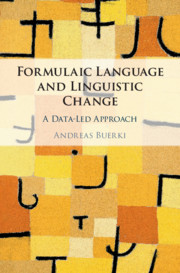
-
Select format
-
- Publisher:
- Cambridge University Press
- Publication date:
- April 2020
- April 2020
- ISBN:
- 9781108769976
- 9781108477468
- Dimensions:
- (228 x 152 mm)
- Weight & Pages:
- 0.48kg, 260 Pages
- Dimensions:
- Weight & Pages:
You may already have access via personal or institutional login
Book description
A substantial proportion of our everyday language is 'formulaic', that is, it consists of oft-repeated chunks. From pause fillers such as you know, to phrases such as Many thanks!, Is this seat taken? or strong tea, they form a phenomenon central in language. This important new book investigates formulaic language from the point of view of language change. Employing a novel quantitative and data-led approach, it traces and analyses change in phraseology across 20th Century German as used in Switzerland. Drawing on nearly 20 million words of textual evidence, it shows that social and cultural change in the speech community is the predominant motivator of change, though other factors are also at play. The book demonstrates a close link between language change and the culture of the speech community, arguing that this has repercussions for the study of language in general, as well as the study of society and history.
Reviews
‘I anticipate this book will become an instant classic, often cited: for its remarkably comprehensive and innovative categorizations and definitions of the phenomenon, and for its presentation of a strong piece of research which employs clever methods and takes us a large step forward in knowledge. The literature review on formulaic language is a definite useful tool for anyone seeking to gain deep understanding of the phenomenon.'
David Wood - Carleton University, Ottawa
‘A rigorous, well-written and well-focused book clearly demonstrating how changes in formulaic language are linked to changes in the cultural context. Its new proposed methodology for the automatic extraction of formulaic expressions from a large body of data, as well as the wealth of useful references provided, will be immensely valuable to researchers and specialists, as well as students.'
Maria Fernandez-Parra - Swansea University
Contents
Metrics
Altmetric attention score
Full text views
Full text views help Loading metrics...
Loading metrics...
* Views captured on Cambridge Core between #date#. This data will be updated every 24 hours.
Usage data cannot currently be displayed.
Accessibility standard: Unknown
Why this information is here
This section outlines the accessibility features of this content - including support for screen readers, full keyboard navigation and high-contrast display options. This may not be relevant for you.
Accessibility Information
Accessibility compliance for the PDF of this book is currently unknown and may be updated in the future.


